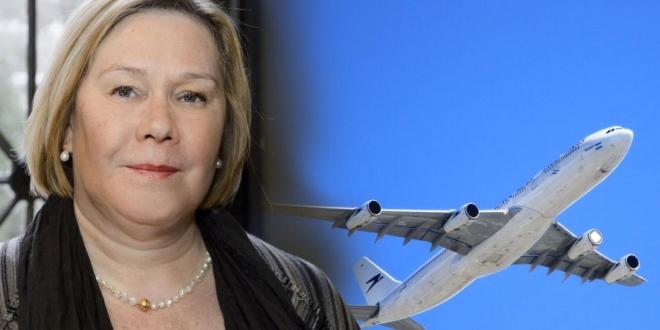Business class and expensive taxis. During 2016, Pro Vice-Chancellor at Lund University Eva Wiberg flew across the globe in a way that violates the University policies.
By: Linus Gisborn Translation: Carl-William Ersgård
On the 28 September 2016, a taxi arrives at Copenhagen Airport. Exiting is Eva Wiberg, Pro Vice-Chancellor at Lund University. She boards a plane for Tokyo, taking off at 3:45 pm. The trip takes eleven hour, she travels at highest standard, and the ticket cost ends up at 42,399 SEK.
In violation of the guidelines
Lund University´s travel policy clearly states what considerations to take before travelling. Official travels are to be “cost-efficient”, and cheap means of travelling are to be picked as long as they do not keep the employees from fulfilling their duties. Employees shall make sure to find the most priceworthy alternatives at travel agencies.
However, a run-through of Eva Wiberg’s invoices during 2016 shows that the Pro Vice-Chancellor does not follow these guidelines. Almost all trips have been made at the highest price-class, and trips made outside of Europe have been exclusively business class, which is the most expensive alternative. Even during short trips within Europe, Wiberg has chosen the most expensive tickets in a majority of the cases.
Luxury flights for over a hundred thousand
In her role as Pro Vice-Chancellor with responsibility for globalisation, Eva Wiberg flew a lot, both inside and outside of Europe. From summer 2016, she was no longer in charge of globalisation, yet she still managed to travel to, among others, Tokyo and Yogyakarta, visit Washington, Milano and Paris. All in all, her travel costs for 2016 amounts to 219,548 SEK.
At all international flights, Eva Wiberg chose business class, which is considerably more expensive than economy class, and violates the University guidelines.
According to Eva Wiberg, her choice of tickets rests on a decision made in conjunction with Vice-Chancellor Torbjörn von Schantz.
“These are definitely no pleasure trips. You are expected to be on site within a couple of hours and ready to be on stage or join a discussion. There is no way to travel economy during so long trips”, Eva Wiberg says.
She holds that it is more cost-efficient to travel business class as opposed to economy.
“It is important to arrive somewhat fresh. Sitting eleven hours at a flight is not that healthy if you want to be fit for fight afterwards. It is about surviving”, Eva Wiberg says.
Yet Eva Wiberg has also chosen to travel in the most expensive price-class during shorter trips within Europe a majority of the times.
18 expensive taxi trips
During 2016, Eva Wiberg has mostly gone to Copenhagen Airport via taxi. From her home address in Lund, she has been ferried across the Öresund Brigde at a one-way price of 1,470 SEK. From the airport and back, the cost is raised by 20 SEK. All in all, the taxi travels amount to around 25,000 SEK.
The guidelines for cost-efficiency have not been followed here either.
“It’s the same thing going on. I have to start at once, often early in the morning, and sometimes the taxi arrives at half past four in the morning. It is the same when I return from a flight. I might need to go directly to a meeting”, Eva Wiberg says.
The University travel agency has no information on a taxi trip at half past four in the morning. Most cases have been in the middle of the day.
“It is about arriving quickly, and sometimes we are more than one person travelling together. This is the normal way of doing it”, Eva Wiberg says.
The difference in time between taking a taxi from Eva Wibergs home in Lund to the airport – as opposed to taking a taxi to the train station, and then going by train across the bridge – is about five minutes. It is difficult to see how that would affect her duties that much.
Still, Wiberg has gone by taxi to and from the airport 18 times. This only includes taxi travels made in conjunction with a trip abroad. Taxi travels made to and from national flights have not been counted.
The University’s travel policy also states that the environmental effects are to be considered when choosing a means of travelling. This has not been followed.
“Of course this is not very friendly for the environment, but it is not out of spite we are doing this. If a person is to travel as much as I have, it must be done efficiently”, Eva Wiberg says.
In line to be Vice-Chancellor
At the end of January, the proposition to make Ole Petter Ottersen Vice-Chancellor at Gothenburg University was retracted. The reason was that Ottersen had not mentioned his candidacy at Karolinska institutet. Instead, Eva Wiberg is now proposed as new Vice-Chancellor at Gothenburg University.
READ ON: After Lundagård’s dig – Eva Wiberg is under inspection
___________________________________________________________________
This is how Lundagård counted Eva Wiberg’s travel costs:
The invoices have been collected from Egencia, the travel agency hired by the University.
The numbers regard costs for Eva Wiberg’s trips abroad from January to December 2016.
Lundagård has only looked at tickets where Lund University stands for 50-100 % of the ticket cost.
When ticket costs have been shared between the University and international network Universitas 21, only the part paid for by Lund University has been counted.
Tickets entirely paid for by Universitas 21 have not been accounted for.
The taxi trips only include trips Eva Wiberg has made in conjunction with a flight abroad. Other taxi trips are not included.
The booking service fee is not included.
Travels by train, Swedish national flights, allowances, and hotel costs are not included.






